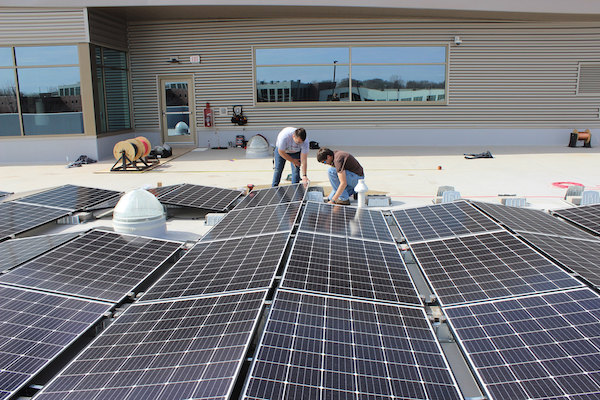For almost a year, the Governor’s Climate Change Task Force has been meeting to discuss ways Wisconsin can tackle climate change and help communities that are already experiencing its dramatic impacts. I was honored to be one of the 32 members appointed to serve on the Task Force and am proud of the dozens of recommendations that were officially unveiled on December 9.
The Task Force was created to help give direction to Governor Evers’ goal of achieving 100% carbon-free energy by 2050, and to meaningfully address the effects of climate change and create a clean energy economy in Wisconsin that supports sustainable job opportunities. We were charged with proposing policy options that are innovative and forward-looking in order to make Wisconsin a leader in reducing greenhouse gas emissions and preparing for the impacts of climate change. To accomplish this Governor Evers appointed representatives including Native Nations, youth activists, environmentalists, educators, insurance, health, agriculture, labor, business and industry and utilities, ensuring a diversity of viewpoints.
The Task Force heard presentations from many communities impacted by the effects of climate change. Before our in-person meetings turned virtual due to COVID-19, we got to tour Central Waters Brewery and hear about their amazing sustainability efforts and use of renewable energy and energy efficiency. We heard from scientists at the Wisconsin Initiative on Climate Change Impacts (WICCI) about how Wisconsin’s climate is changing, and from the Oneida Nation about the importance of food sovereignty, and from Walnut Way Conservation Corporation and Groundwork Milwaukee on how we can transform our communities through projects that benefit climate resilience. It was incredibly inspiring.
But most importantly, over the course of 5 virtual listening sessions, the Task Force heard from over 1000 people from almost every county in Wisconsin who wanted to share their thoughts about how Wisconsin can tackle climate change. An additional 300 comments were submitted in writing. I was so grateful to see such a robust turnout of people that took time out of their busy schedule to weigh in on this critical topic. The passionate testimony of people around the state highlighted the need for immediate and bold action.
Take Action: Tell Gov. Evers and lawmakers to move these recommendations forward.
I was especially happy to see our Chair, Lieutenant Governor Mandela Barnes, direct the Task Force to incorporate environmental justice principles into our recommendations. As the Task Force discussed policy options, we were deliberately evaluating the impacts on underserved communities. It is critically important that we ensure that communities of color and low-income communities are not unintentionally negatively impacted by policy actions and also important that we place greater emphasis on solutions that have the biggest benefit to the communities that have been disproportionately impacted by the impacts of climate change. It is critical that we add this environmental justice lens to all the policy efforts of the state, and I’m glad the Task Force placed such an emphasis on this work.
The Governor will now evaluate the recommendations and decide how to best incorporate them into his administrative policy-making, and others will need approval of the state legislature. Governor Evers understands that the economic and human costs of climate change cannot be ignored, and we are confident that Wisconsin can take meaningful action to combat the climate crisis.
The policies of the Task Force report focus on steps to reduce emissions, create rural and urban economic and job opportunities, modernize Wisconsin’s energy and transportation systems, increase energy independence, enhance resiliency, protect resources, and allow for cost savings by encouraging energy efficiency and reducing waste. Clean Wisconsin is particularly excited about recommendations to:
- Significantly increase funding and efforts through the state Focus on Energy program to reduce carbon emissions by promoting energy efficiency and supporting innovative technologies.
- Update residential and commercial building codes to make sure new construction includes sustainable infrastructure like increased renewable energy, electric vehicles charging and energy efficiency.
- Create a carbon farming program that targets farmland as a natural carbon sink.
- Invest in additional urban and rural tree planting to increase carbon sequestration and reduce urban heat islands.
- Increase access to renewable energy for all
- Increase funding for public transit and walking and biking trails as well as promoting electric vehicles to reduce automobile emissions.
- Create an Office of Environmental Justice within state government to ensure implementation of these policies appropriately incorporates the needs of communities that feel disproportionate impacts of the climate change.
- Use more green infrastructure practices to ensure the increased flood waters associated with climate change can stay out of basements and out of our waterways.
- Ensure the state is acting as a leader in its own operations by making investments in renewable energy, energy efficiency at state buildings, converting fleets to electric vehicles and implementing procurement policies that prioritize sustainability.
The Task Force heard loud and clear that it is time for change. The recommendations reflect that urgency, and Clean Wisconsin will work tirelessly to make sure these policies become reality. The Task Force report is really just the beginning of Wisconsin’s efforts to tackle climate change. There is a lot of hard work ahead, and we will need the voices of members like you in making these recommendations a reality. You can take action here to tell Gov. Evers and state lawmakers: move these recommendations forward.
The official report of the Governor’s Climate Change Task Force report will be available at www.climatechange.wi.gov.

